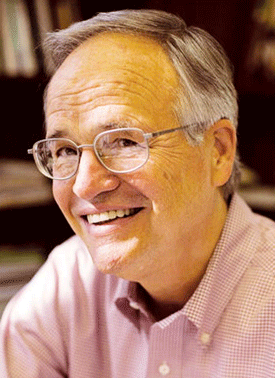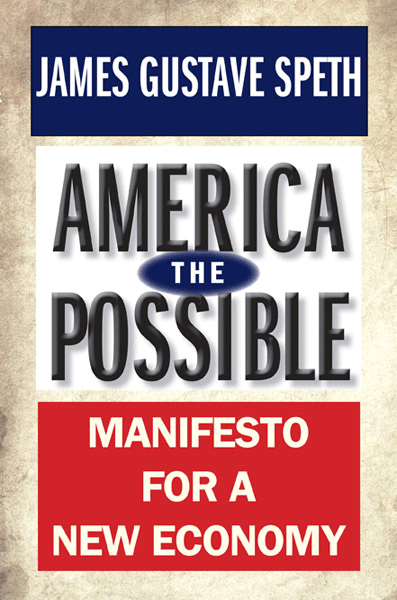America the Possible
Air Date: Week of October 19, 2012
 |
Presidential advisor and Vermont Law professor James Gustave Speth has a new book out titled, America the Possible: Manifesto for a New Economy. Speth talks with host Steve Curwood about ways to reinvent the American economy as one that values nature and quality of life over GDP.
Transcript
CURWOOD: James Gustave Speth chaired the White House Council on Environmental Quality for President Carter, helped found the Natural Resources Defense Council and the World Resources Institute, then ran the UN Development Program and the Yale School of Forestry and Environmental Studies.
You'd hardly think that he's a radical with a resume like that, but Gus Speth was arrested in front of the White House for protesting the XL pipeline in 2011. He's now a professor at the Vermont Law School, and writes that our politics are so corrupt and our environmental movement so weak that we are in peril. His new book is "America the Possible: Manifesto for a New Economy.”
SPETH: Do we want to merely revive the economy with all its failings or do we want to transform the economy into one where the real priorities of economic activities in our country are people and place and planet. And this old economy that everyone is struggling to revive was a pretty sad place, it still is a pretty sad place. During the period where economic growth went up 125 percent since 1980, we’ve had inequality mount, poverty mount, jobs fled our borders, we lost 42,000 manufacturing plants, the environment decline, life satisfaction flat-lined. I mean, that’s what happened in the old economy.
And, you know, it is now already higher GDP then it was before the Great Recession of 2008, and yet we still have all these problems. We need an economy that doesn’t simply prioritize growth, but more importantly puts a priority on sustaining people, sustaining place, sustaining planet.
CURWOOD: What’s wrong with GDP, why do you see it as such a threat to the environment and our society?

SPETH: Well, I have a chapter on that in “America the Possible” and, we need a new system of indicators that give us the right signals of whether we’re making national progress. Now Bobby Kennedy in 1968 made a powerful attack on GDP, pointing out that it is simply an aggregation of every economic transaction in a society, whether it’s good or bad or indifferent. And a lot of them are bad and you can ratchet up GDP by having an oil spill in the Gulf.
CURWOOD: Bobby Kennedy was running for president back then. His words on how we measure the economy still resonate today. Here they are:
[KENNEDY CLIP: Our Gross National Product now is over 800 billion dollars a year. But that Gross National Product, if we judge the United States of America by that, that Gross National Product counts air pollution and cigarette advertising and ambulances to clear our highways of carnage, it counts special locks for our doors and the jails for the people who break them, it counts in the destruction of the Redwoods and the loss of our natural wonder and chaotic sprawl. It counts napalm.
And it counts nuclear warheads and armored cars for the police to fight the riots in our cities. It counts with it rifles and fixed knives and the television programs which glorify violence in order to sell toys to our children. The Gross National Product does not allow the health of our children, the quality of their education, or the joy of their play, it does not include the beauty of our poetry, the strength of our marriages, the intelligence of our public debates, or the integrity of our public officials.
It measures neither our wit, nor our courage, neither our wisdom, nor our learning, neither our compassion nor our devotion to our country. It measures everything in short, except that which makes life worthwhile. And it can tell us everything about America except why we are proud that we are Americans.]
CURWOOD: Just months after he gave that speech, Bobby Kennedy was assassinated. And GDP is still the measure of America’s success. Again, Gus Speth.
SPETH: We need a really good measure of sustainable economic welfare that can go toe-to-toe with GDP every quarter. And there have been efforts to do that and what they show is that during the past few decades when GDP per capita went up and up and up, life satisfaction on average, a genuine progress indicator measure, flat-lined during that period.
CURWOOD: Lets talk about money. In your book, “America the Possible”, you’re quite critical of the way that money is created in this society by banks, detail to us what’s wrong with society in that process and how you would change it.
SPETH: Most money that’s in society is created by bank debt when people take out loans from banking institutions. So, it gives the banking institutions tremendous power, I mean, money is a system of power. And the banks determine who gets money, and overwhelmingly the process of investment in our society is chasing the highest financial return. That leads to many things that are highly destructive, such as investing in mountaintop removal, and tar sands and other things which the big banks are doing now. And it leads to severe underinvestment in social and environmental needs that don’t yield a high financial return.
CURWOOD: In a new America, how would we address social inequality?
SPETH: I think compared with Europe for example, we have a very weak unemployment insurance program. It reaches a very small portion of the unemployed and it compensates for a smaller percentage of wages, and we could certainly improve our unemployment insurance program, we could certainly improve the minimum wage program.
And through other means, including tilting the collective bargaining process and unionization process back towards organized labor, which we’ve tilted away from dramatically in recent decades, and of course the tax structure needs to be changed. In 1928, the top one percent of earners had about 24 percent of national income.
It went down by the mid 70s to about 7 percent of national income, but now, it’s gone all the way back up again to about 24 percent of the national income. So one goal that we ought to have for our society, in a way a minimum goal, is to return to the kind of income equality we had in the mid-70s. Not a terribly radical proposal, because we were there at one time, and it was a better place.
CURWOOD: And how does this affect the environment?
SPETH: The environment and the equity issues go together. People that are economically insecure find it really hard to address environmental issues when they have more pressing concerns with their pocket books. And when you try to do something like impose a charge, easily called a tax, on carbon emissions, and people see that that could raise gasoline prices and energy prices and they are already having trouble paying those bills, they become opponents of doing the right thing to save the planet’s climate. And so we need a more just economic system and I think that would provide the basis for more rigorous environmental protection.
CURWOOD: Now, in your career, you’ve worked closely with elected officials. President Jimmy Carter, you chaired the Council on Environmental Quality for him. Advised Bill Clinton. You’ve been close to electoral politics. In your view, what’s wrong with our democracy now, and how should we fix it?
SPETH: Well we certainly have what I call a creeping corporate-ocracy and plutocracy. You see the plutocracy, the money taking power in our politics everyday now. Corporations spend a lot more on lobbying then they do on campaigns - a lot more. We always have know that corporations were the principal economic actors in our system but I would say that they are now the principal political actors in our system and I think that there are things that we need to do.
We need to start by securing the voters. People automatically being registered to vote when the reach the age of 18, that’s common in advanced industrial countries. And we need to make voting easier, a longer time ahead of the election day to vote. Have a national holiday on Election Day. The other big thing we need to do is to enact a type of campaign finance reform that really works. And the latest proposal would be… if you make a small contribution, 250 dollars, to the president or someone running for Congress, the federal government would match that five to one. You know, if you had enough supporters, you could raise enough money to run a competitive campaign.
CURWOOD: So, your book, Gus Speth, America the Possible, a Manifesto for a New Economy, is a huge, broad vision that would change almost everything in America. The question is how do you get there from here? If the political system is broken, how do you make political change?
SPETH: Well, I want to make a prediction. Which is that when this election is over, there are going to be so many people fed up with what we have experienced in the process that there could well be a confluence of interests coming together to enact a set of pro-democracy political reforms.
I think we need an era to revive an era of protest, to revive an era of marches and demonstrations and non-violent civil disobedience. If it’s done in the right way, it can build support and it can dramatize the need for change. We saw that with the civil rights movement, and we need that kind of fervor again if we are going to build the America the Possible for our grandchildren.
[MUSIC: Brian Blade “Struggling With That” from Mama Rosa (Verve Music Group 2009).]
CURWOOD: Thank you, Gus, for coming in.
SPETH: Thank you, Steve.
CURWOOD: Vermont law professor Gus Speth. His book is "America the Possible: Manifesto for a New Economy."
Links
Living on Earth wants to hear from you!
Living on Earth
62 Calef Highway, Suite 212
Lee, NH 03861
Telephone: 617-287-4121
E-mail: comments@loe.org
Newsletter [Click here]
Donate to Living on Earth!
Living on Earth is an independent media program and relies entirely on contributions from listeners and institutions supporting public service. Please donate now to preserve an independent environmental voice.
NewsletterLiving on Earth offers a weekly delivery of the show's rundown to your mailbox. Sign up for our newsletter today!
 Sailors For The Sea: Be the change you want to sea.
Sailors For The Sea: Be the change you want to sea.
 The Grantham Foundation for the Protection of the Environment: Committed to protecting and improving the health of the global environment.
The Grantham Foundation for the Protection of the Environment: Committed to protecting and improving the health of the global environment.
 Contribute to Living on Earth and receive, as our gift to you, an archival print of one of Mark Seth Lender's extraordinary wildlife photographs. Follow the link to see Mark's current collection of photographs.
Contribute to Living on Earth and receive, as our gift to you, an archival print of one of Mark Seth Lender's extraordinary wildlife photographs. Follow the link to see Mark's current collection of photographs.
 Buy a signed copy of Mark Seth Lender's book Smeagull the Seagull & support Living on Earth
Buy a signed copy of Mark Seth Lender's book Smeagull the Seagull & support Living on Earth

